Lasswell Harold D. The Political Writings of Harold D. Lasswell
Подождите немного. Документ загружается.

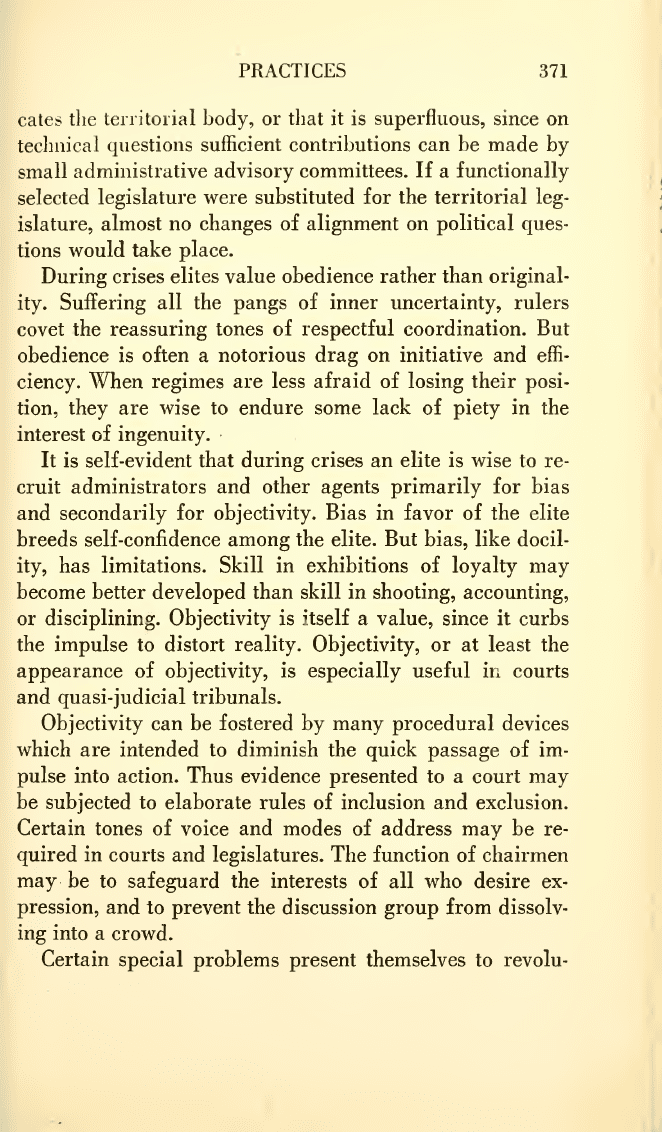
PRACTICES
371
cates
the
territorial body,
or that it
is
superfluous,
since on
technical
questions sufficient contributions can be
made by
small
administrative
advisory committees. If
a
functionally
selected
legislature
were substituted
for the
territorial leg-
islature,
almost no
changes
of
alignment
on
political
ques-
tions
would take
place.
During
crises elites value obedience rather
than original-
ity.
Suffering all the pangs of
inner uncertainty, rulers
covet
the reassuring tones of respectful
coordination. But
obedience
is often
a
notorious
drag
on
initiative
and
effi-
ciency. When
regimes are
less afraid
of losing their posi-
tion, they are wise to
endure
some lack of piety in the
interest of
ingenuity.
It is
self-evident that during crises an elite is wise
to re-
cruit
administrators and other agents primarily for bias
and
secondarily for objectivity. Bias in favor of the elite
breeds
self-confidence among the elite. But bias, like
docil-
ity, has
limitations. Skill in exhibitions
of
loyalty
may
become
better
developed
than skill
in
shooting, accounting,
or disciplining. Objectivity is itself
a
value, since
it curbs
the
impulse
to
distort reality. Objectivity, or
at least the
appearance
of objectivity, is
especially useful
in courts
and quasi-judicial tribunals.
Objectivity
can be
fostered
by
many procedural
devices
which are
intended
to diminish the quick
passage of
im-
pulse into action. Thus evidence presented
to a court may
be
subjected to elaborate rules
of
inclusion
and
exclusion.
Certain
tones of voice and modes of address may
be re-
quired in courts
and legislatures.
The
function
of
chairmen
may be to
safeguard the interests
of
all who desire ex-
pression, and
to prevent the discussion group from dissolv-
ing
into
a crowd.
Certain
special
problems
present themselves
to
revolu-
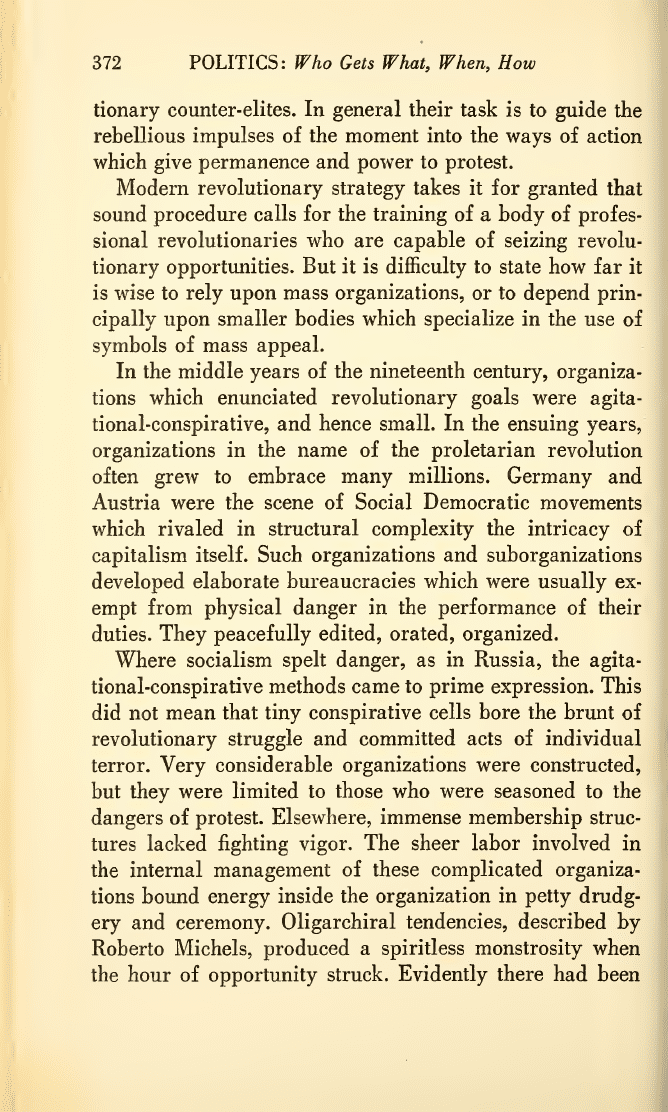
372
POLITICS: Who Gets What, When,
How
tionary
counter-elites. In general their
task is
to guide
the
rebellious
impulses of the moment into
the ways of
action
which give permanence
and
power to
protest.
Modern
revolutionary strategy takes
it for granted
that
sound
procedure calls
for
the
training
of
a body of profes-
sional revolutionaries
who are capable
of
seizing
revolu-
tionary
opportunities. But it is difficulty to
state how far
it
is
wise
to
rely upon mass
organizations,
or to depend
prin-
cipally
upon smaller
bodies which specialize
in the
use of
symbols of mass
appeal.
In the
middle years of the
nineteenth
century,
organiza-
tions
which enunciated revolutionary goals were
agita-
tional-conspirative, and hence
small.
In the ensuing years,
organizations in the
name
of
the proletarian
revolution
often grew to
embrace many millions.
Germany and
Austria were the scene of
Social Democratic
movements
which rivaled in
structural complexity the intricacy
of
capitalism
itself.
Such
organizations and suborganizations
developed
elaborate
bureaucracies
which
were
usually
ex-
empt
from physical danger
in the performance
of
their
duties. They
peacefully
edited, orated, organized.
Where socialism
spelt danger,
as
in
Russia, the agita-
tional-conspirative
methods came to prime expression.
This
did not
mean that
tiny conspirative cells bore the brunt
of
revolutionary
struggle and committed acts of individual
terror. Very
considerable organizations were constructed,
but they were
limited to
those
who
were
seasoned to the
dangers
of
protest.
Elsewhere, immense membership struc-
tures lacked
fighting vigor. The sheer
labor involved
in
the internal
management of these
complicated organiza-
tions bound
energy inside the
organization
in petty drudg-
ery and
ceremony.
Oligarchiral
tendencies,
described
by
Roberto Michels,
produced a
spiritless monstrosity
when
the hour of
opportunity
struck. Evidently
there
had
been
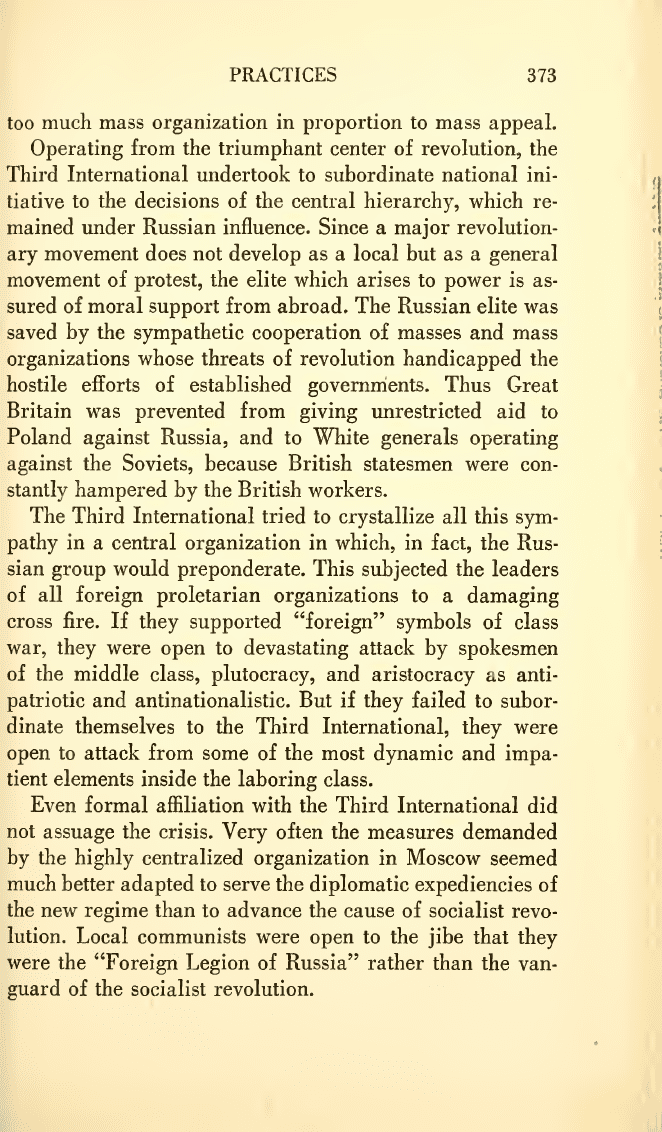
PRACTICES
373
too
much mass
organization
in
proportion
to mass
appeal.
Operating from the triumphant center
of revolution, the
Third
International undertook
to
subordinate
national ini-
tiative to
the decisions
of the
central hierarchy,
which re-
mained under Russian influence.
Since a major revolution-
ary movement
does
not develop
as a local but as a general
movement of protest, the elite which arises
to power is as-
sured of moral support from abroad. The
Russian elite was
saved by the sympathetic cooperation
of masses
and
mass
organizations
whose threats of revolution
handicapped the
hostile efforts
of
established governnients.
Thus Great
Britain
was prevented from giving imrestricted
aid to
Poland against
Russia, and to White generals operating
against
the Soviets, because British statesmen were
con-
stantly hampered
by the
British
workers.
The Third International tried
to crystallize all this
sym-
pathy in
a
central organization
in which, in fact,
the Rus-
sian
group would preponderate.
This subjected
the leaders
of all foreign
proletarian organizations to
a
damaging
cross
fire. If
they
supported
"foreign" symbols
of class
war,
they were
open to
devastating
attack
by spokesmen
of the middle class,
plutocracy, and aristocracy
as anti-
patriotic and antinationalistic.
But if they failed
to subor-
dinate
themselves
to the Third International, they
were
open to attack from
some of the most dynamic
and impa-
tient
elements inside the
laboring class.
Even
formal affiliation with
the Third International
did
not
assuage the crisis. Very often
the measures demanded
by the highly centralized
organization
in Moscow
seemed
much better
adapted to
serve
the diplomatic
expediencies
of
the
new regime than
to
advance
the cause of socialist
revo-
lution.
Local communists were open to the jibe
that
they
were the "Foreign Legion
of Russia" rather
than the
van-
guard
of
the
socialist
revolution.
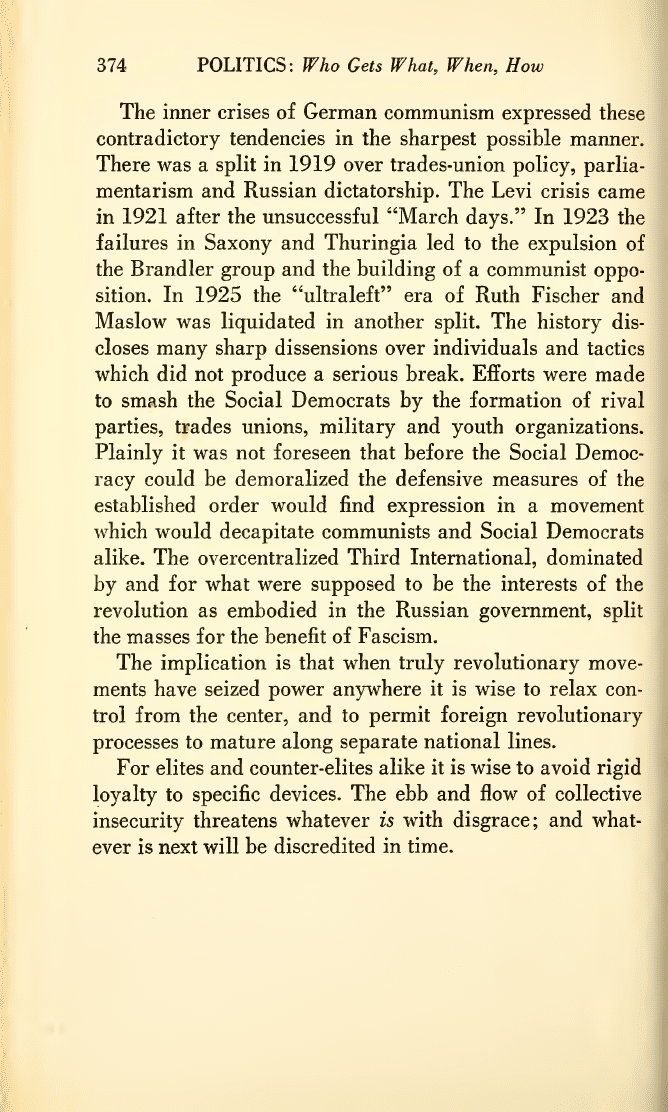
374
POLITICS:
Who Gets What, When,
How
The inner crises of German communism
expressed
these
contradictory tendencies in
the
sharpest
possible
manner.
There was
a
split in 1919 over trades-union
policy,
parlia-
mentarism
and
Russian dictatorship.
The Levi
crisis
came
in
1921 after the unsuccessful "March
days." In 1923
the
failures in Saxony and
Thuringia
led to
the expulsion
of
the
Brandler group and
the
building
of
a
communist
oppo-
sition. In 1925 the "ultraleft" era
of Ruth Fischer
and
Maslow was liquidated in another split.
The history
dis-
closes many sharp dissensions over individuals
and tactics
which did not produce a
serious break.
Efforts were
made
to smash the Social
Democrats
by the formation
of rival
parties, trades unions,
military
and youth organizations.
Plainly
it was not
foreseen that before the
Social Democ-
racy could be demoralized the defensive
measures of the
established order would find expression in
a
movement
which would decapitate communists and Social Democrats
alike. The overcentralized
Third International,
dominated
by and for what were supposed
to
be the
interests
of the
revolution as embodied
in the Russian government,
split
the masses for the
benefit
of
Fascism.
The implication is
that when truly revolutionary
move-
ments have
seized power anywhere
it
is wise to relax con-
trol from the
center, and to
permit
foreign revolutionary
processes to
mature along
separate
national lines.
For
elites and
counter-elites alike it is wise to avoid rigid
loyalty to
specific devices.
The
ebb
and flow of collective
insecurity
threatens
whatever is with disgrace; and what-
ever is
next will be
discredited
in time.
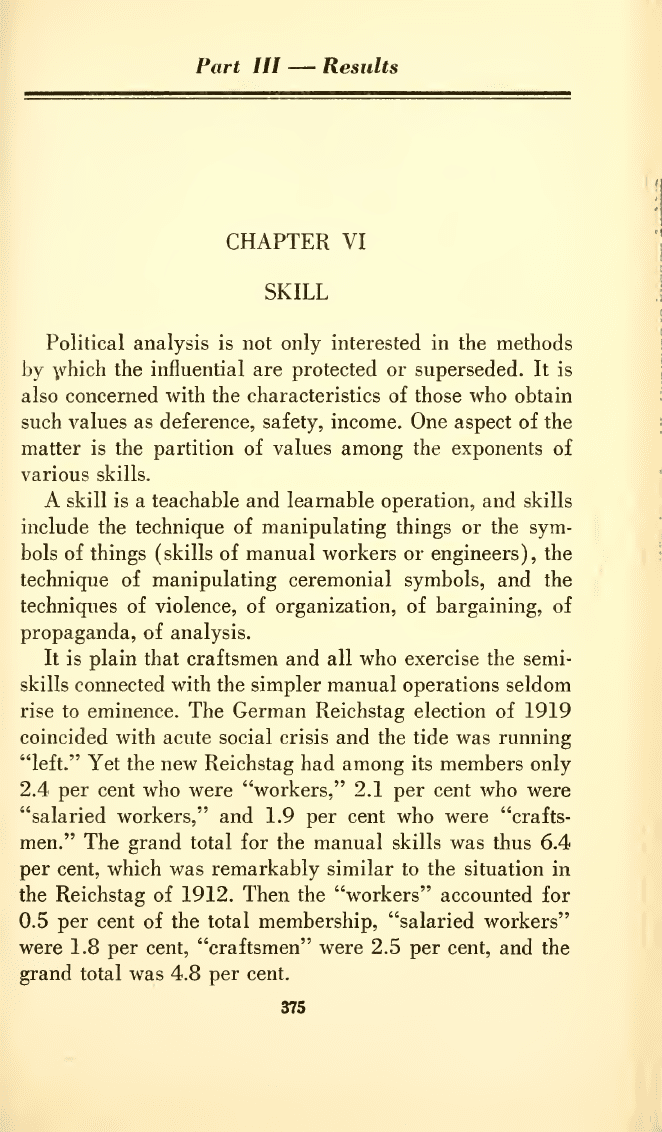
Part
III
—
Results
CHAPTER
VI
SKILL
Political
analysis
is
not only interested
in the methods
by
^hich the
influential
are protected or superseded. It
is
also concerned with the characteristics of those who
obtain
such values as deference, safety, income. One aspect of the
matter is the partition of values among the exponents
of
various skills.
A skill is a teachable
and
learnable operation, and skills
include the technique of manipulating things or the sym-
bols of things (skills of manual workers or engineers), the
technique of manipulating ceremonial symbols,
and
the
techniques
of
violence, of organization,
of
bargaining,
of
propaganda,
of
analysis.
It is plain that craftsmen and all who exercise the semi-
skills
comiected
with
the
simpler
manual operations seldom
rise to eminence. The
German
Reichstag election of 1919
coincided
with
acute
social
crisis
and the tide was running
"left." Yet
the new
Reichstag
had among its members only
2.4 per
cent who were
"workers,"
2.1 per cent
who
were
"salaried workers,"
and 1.9 per cent who
were
"crafts-
men."
The
grand total
for the
manual skills
was thus 6.4
per cent, which was remarkably similar
to
the
situation
in
the Reichstag of 1912. Then the "workers"
accounted for
0.5 per cent
of the
total membership, "salaried workers"
were
1.8
per cent, "craftsmen"
were
2.5 per cent,
and the
grand
total was 4.8
per cent.
375
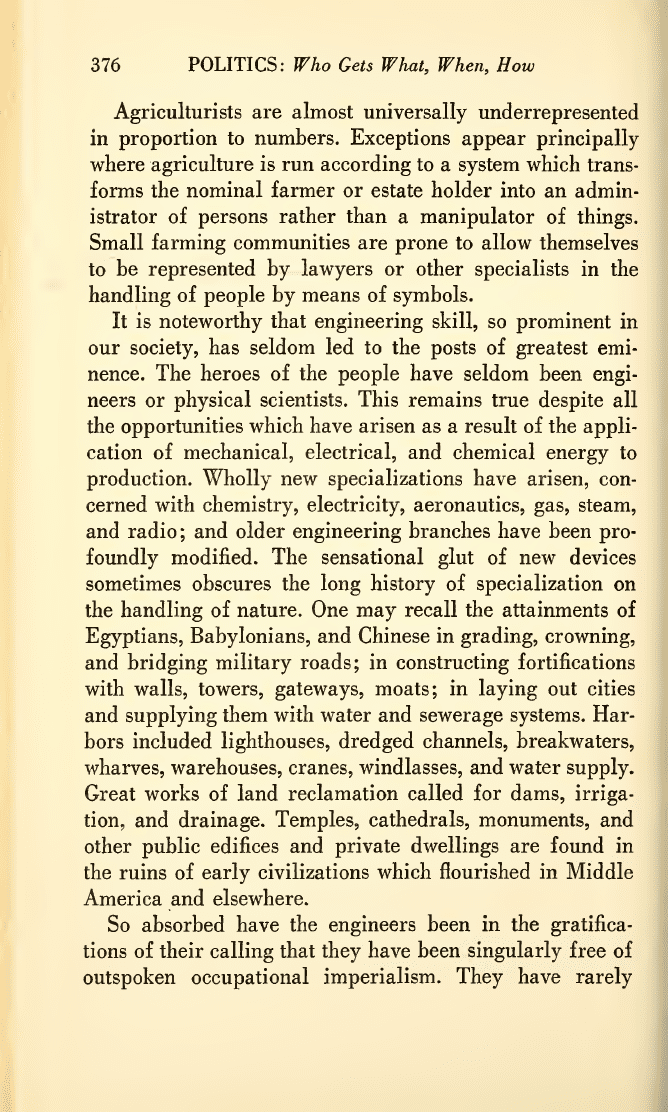
376
POLITICS: Who
Gets What, When,
How
Agriculturists
are
almost universally
underrepresented
in
proportion to
numbers.
Exceptions appear
principally
where agriculture is run according to
a
system
which trans-
forms
the
nominal farmer or
estate holder into
an admin-
istrator of
persons rather than
a manipulator of things.
Small
farming communities are prone to allow
themselves
to be
represented by
lawyers
or other specialists
in the
handling of
people by means of symbols.
It
is noteworthy that
engineering
skill,
so prominent
in
our society, has
seldom
led to the posts of greatest
emi-
nence. The
heroes of the people
have seldom
been engi-
neers or
physical scientists. This remains true
despite
all
the
opportunities which have arisen
as a
result
of the appli-
cation of mechanical, electrical, and chemical energy
to
production. Wholly
new specializations
have arisen,
con-
cerned with chemistry,
electricity,
aeronautics, gas, steam,
and
radio; and older engineering
branches
have been pro-
foundly modified. The
sensational glut
of new devices
sometimes obscures the long
history
of
specialization
on
the handling of nature. One may recall
the
attainments
of
Egyptians,
Babylonians, and Chinese in grading, crowning,
and
bridging
military roads; in constructing fortifications
with walls,
towers, gateways, moats; in laying out cities
and supplying
them with water and sewerage systems. Har-
bors included
lighthouses, dredged channels, breakwaters,
wharves,
warehouses, cranes, windlasses,
and water
supply.
Great
works of land
reclamation called for dams, irriga-
tion, and drainage.
Temples, cathedrals, monuments,
and
other public edifices
and private dwellings are found in
the ruins of
early civilizations which
flourished in
Middle
America
and
elsewhere.
So
absorbed have
the engineers been in the gratifica-
tions of
their calling that they have
been
singularly
free of
outspoken occupational
imperialism. They have rarely
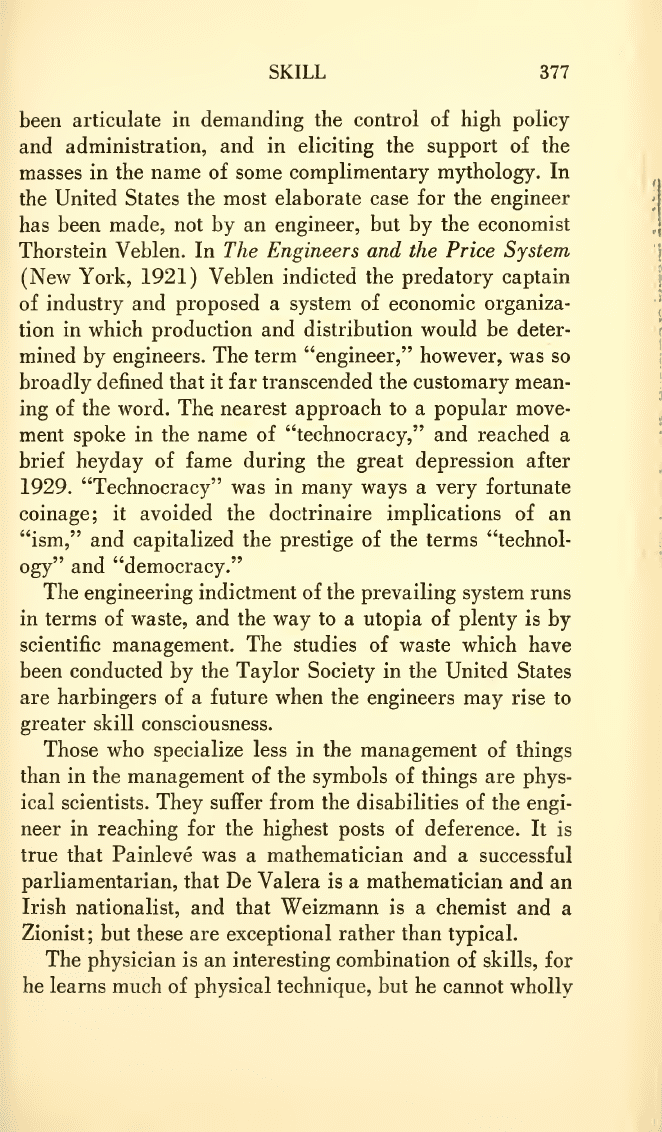
SKILL 377
been
articulate in
demanding the control of high policy
and
administration,
and in eliciting the
support
of the
masses in the
name of
some
complimentary mythology. In
the
United States the most elaborate case
for the engineer
has
been made, not by an
engineer,
but by
the
economist
Thorstein Veblen. In
The Engineers and the Price
System
(New
York,
1921)
Veblen indicted the predatory captain
of industry and
proposed
a
system of economic
organiza-
tion in
which production and
distribution
would be deter-
mined
by
engineers. The term
"engineer," however,
was so
broadly defined that it far
transcended
the
customary
mean-
ing of the word.
The
nearest
approach
to a
popular
move-
ment spoke in the name of
"technocracy," and reached
a
brief heyday of fame
during
the
great depression
after
1929.
"Technocracy"
was in many
ways a
very
fortunate
coinage; it avoided the
doctrinaire implications
of an
"ism,"
and
capitalized
the
prestige
of the
terms
"technol-
ogy" and "democracy."
The engineering indictment of the prevailing
system runs
in
terms
of waste, and
the way to
a
Utopia
of
plenty
is
by
scientific management. The studies
of waste which
have
been conducted
by
the Taylor Society
in
the
United States
are harbingers of a future when the engineers
may rise to
greater skill consciousness.
Those who specialize less in the management
of things
than
in the management of the symbols
of
things
are phys-
ical
scientists. They
suffer from
the disabilities
of the engi-
neer
in
reaching for the highest
posts of deference.
It
is
true
that Painleve
was
a
mathematician and a
successful
parliamentarian,
that
De
Valera is a mathematician
and
an
Irish nationalist,
and
that Weizmann is
a chemist
and
a
Zionist;
but
these
are exceptional rather than
typical.
The
physician
is
an interesting combination
of
skills,
for
he learns
much of physical
technique,
but
he cannot wholly
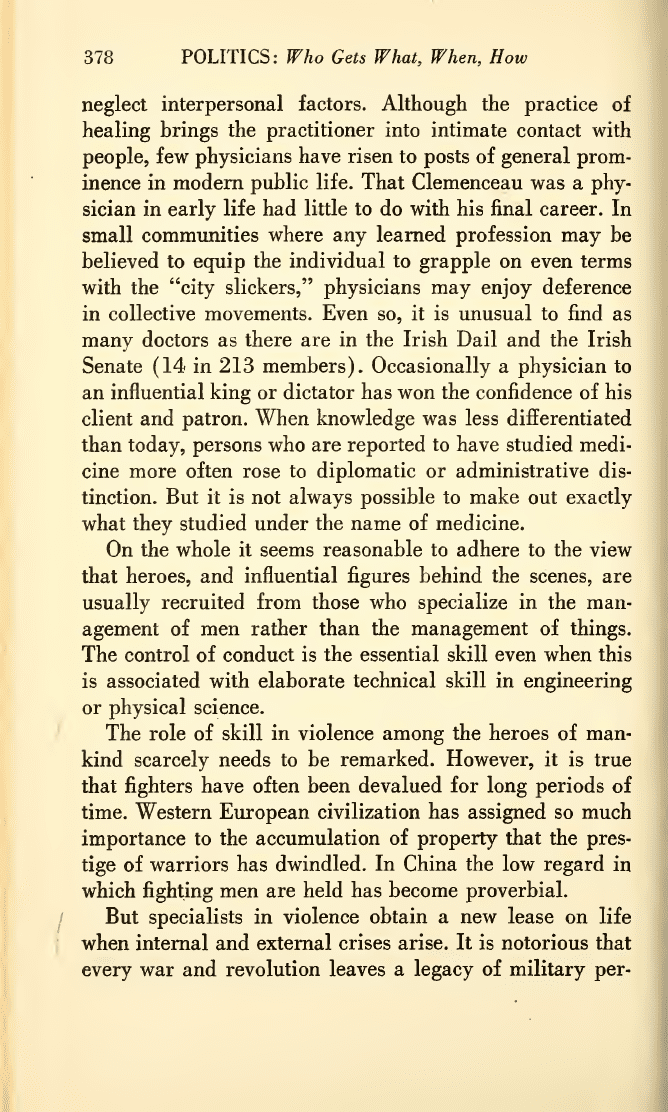
378
POLITICS:
Who
Gets
What, When,
How
neglect
interpersonal factors. Although the practice
of
healing brings the
practitioner into intimate
contact with
people, few
physicians have
risen
to posts
of
general
prom-
inence in modem
public life.
That Clemenceau
was a
phy-
sician in early
life had
little
to do with his final career. In
small
communities
where any learned profession
may be
believed to
equip the individual to grapple
on even terms
with the
"city slickers,"
physicians
may enjoy deference
in
collective
movements. Even
so,
it is
imusual to find
as
many
doctors as
there are in the Irish Dail and the
Irish
Senate
(14
in
213 members). Occasionally
a
physician
to
an
influential king or dictator has won the confidence of his
client
and patron. When knowledge was less
differentiated
than today,
persons who are
reported to
have
studied
medi-
cine more often rose to
diplomatic or administrative
dis-
tinction. But it is not
always possible
to
make
out
exactly
what they studied under
the
name
of medicine.
On the whole it
seems reasonable to adhere to the
view
that heroes, and
influential figures behind the scenes, are
usually
recruited from those who specialize in the man-
agement of
men rather than the
management
of things.
The
control
of
conduct is the
essential skill even when
this
is
associated with elaborate
technical skill in engineering
or physical science.
The role of skill
in violence among the heroes
of
man-
kind scarcely needs
to
be
remarked. However,
it is true
that
fighters have often been devalued
for long periods
of
time. Western European
civilization has assigned
so much
importance to the
accumulation of
property
that the pres-
tige of
warriors has
dwindled. In China the low regard
in
which
fighting men are
held
has
become proverbial.
But specialists in violence
obtain a new lease
on life
when internal and
external crises arise. It is notorious that
every war and
revolution leaves a legacy of
military per-
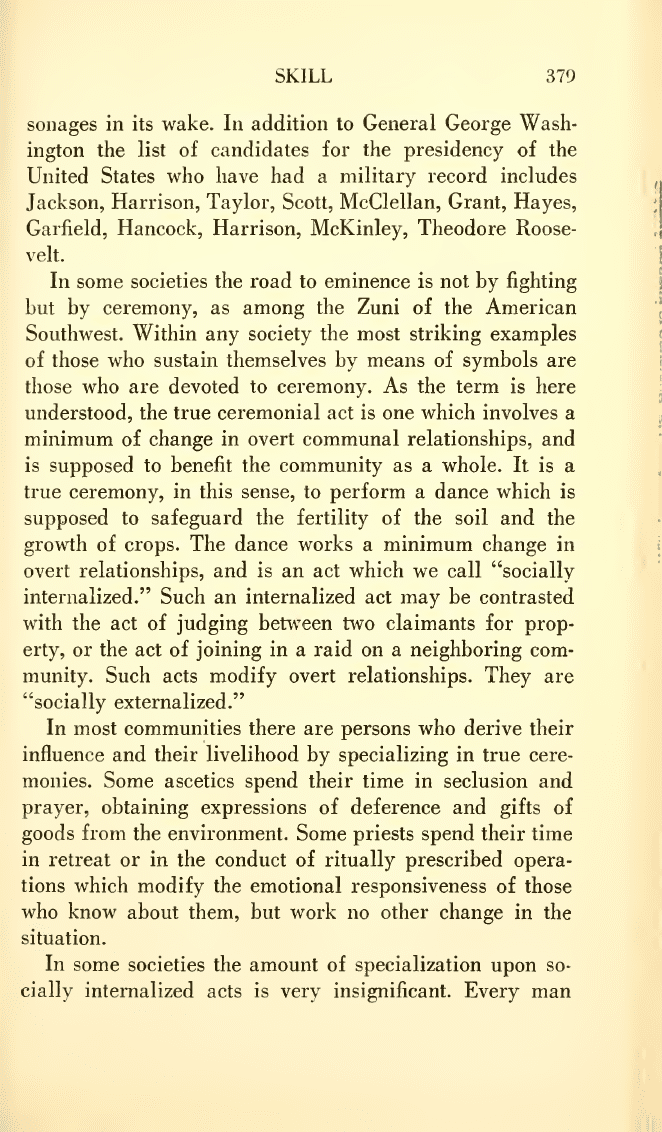
SKILL 379
sonages in its
wake. In addition to General George Wash-
ington the
list of candidates for
the presidency
of the
United States who have had a
military record includes
Jackson,
Harrison, Taylor, Scott,
McClellan, Grant, Hayes,
Garfield,
Hancock,
Harrison,
McKinley, Theodore
Roose-
velt.
In some
societies
the road to eminence is not by
fighting
but by ceremony, as
among the Zuni
of the
American
Southwest.
Within
any
society the most striking examples
of those who sustain
themselves
by
means
of symbols are
those who are devoted
to ceremony. As the term
is here
understood, the true
ceremonial
act is one
which
involves
a
minimum
of
change in
overt communal relationships,
and
is supposed to
benefit
the
community
as a whole. It is
a
true ceremony, in this
sense,
to
perform
a
dance
which is
supposed to
safeguard
the
fertility
of the soil and
the
growth of crops. The
dance works
a
minimum change
in
overt relationships, and is an act
which
we call "socially
internalized." Such an
internalized
act may be contrasted
with
the act of
judging
between two claimants for prop-
erty,
or the act of
joining
in a raid on a neighboring
com-
munity.
Such acts modify overt relationships. They
are
"socially externalized."
In
most
communities
there are persons who derive their
influence
and their
livelihood
by specializing in true cere-
monies.
Some ascetics
spend
their time in seclusion and
prayer, obtaining expressions
of deference and gifts
of
goods from
the
environment.
Some priests
spend
their time
in
retreat or in the conduct
of
ritually prescribed
opera-
tions
which modify the emotional responsiveness
of those
who know
about them, but work no
other
change
in the
situation.
In
some
societies the amount of specialization
upon
so-
cially
internalized
acts
is very insignificant.
Every man
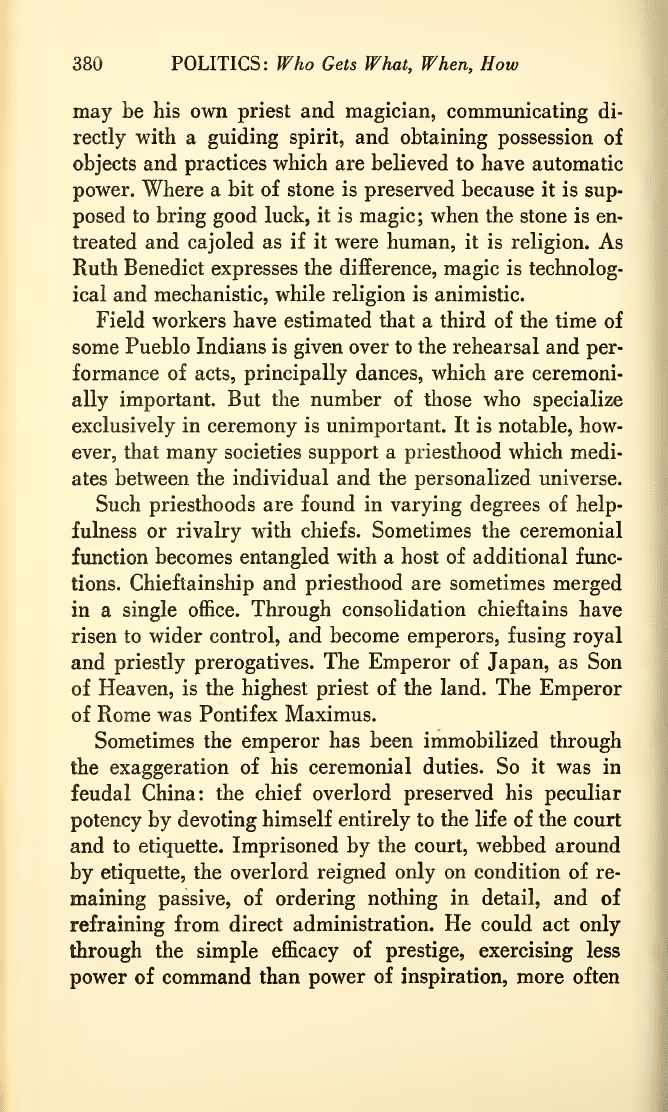
380 POLITICS: Who Gets What, When,
How
may be
his own priest and magician,
communicating
di-
rectly with
a
guiding spirit, and obtaining
possession
of
objects and practices
which
are believed to have
automatic
power. Where a
bit
of
stone
is
preserved
because
it is sup-
posed to
bring
good
luck, it is magic; when the
stone
is
en-
treated and cajoled as if it were human, it is religion.
As
Ruth
Benedict expresses the
difference,
magic
is
technolog-
ical and mechanistic,
while religion
is animistic.
Field
workers
have
estimated that
a
third
of the time
of
some
Pueblo Indians is given over
to
the rehearsal
and per-
formance of
acts, principally dances, which
are ceremoni-
ally
important. But the number of
those
who specialize
exclusively in ceremony is unimportant. It
is notable, how-
ever,
that many societies support a priesthood which
medi-
ates
between the individual and the personalized universe.
Such
priesthoods are
found
in varying degrees of help-
fulness
or rivalry with chiefs.
Sometimes
the ceremonial
function
becomes entangled
with
a host of
additional
func-
tions.
Chieftainship and
priesthood
are
sometimes
merged
in
a
single office. Through
consolidation chieftains
have
risen to
wider control, and
become emperors, fusing
royal
and
priestly prerogatives. The
Emperor of
Japan,
as Son
of
Heaven, is the
highest priest of the land. The
Emperor
of Rome
was
Pontifex Maximus.
Sometimes the
emperor has been immobilized through
the
exaggeration of his ceremonial duties. So
it
was in
feudal China:
the chief overlord
preserved
his peculiar
potency by
devoting himself
entirely
to
the life
of
the
court
and to
etiquette.
Imprisoned
by
the court, webbed around
by
etiquette, the
overlord reigned
only on
condition of
re-
maining
passive,
of
ordering
nothing in detail,
and
of
refraining from
direct
administration. He
could act only
through the simple
efficacy
of
prestige,
exercising
less
power of command
than power of
inspiration,
more often
